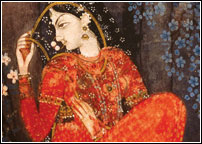|


The Beloved
By: Muhammed Afzal Shahid
Dawn: May 4, 2008
 ‘Bullhe nun parhaya te oh sarangi phar nacheya te ganveya. Tenun
parhaya te tun ishqiya qisse likhe.’ (I taught Bulleh Shah and he
danced and sang playing a violin. I taught you and you wrote a love
story), were the alleged painful remarks of Hafiz Ghulam Murtaza of
Kasur to his student, Waris Shah, when the latter is said to have tried
to gain blessings of his beloved teacher on completing his anthology of
Heer. However, the next day, after listening to selections from Heer,
such as:
‘Bullhe nun parhaya te oh sarangi phar nacheya te ganveya. Tenun
parhaya te tun ishqiya qisse likhe.’ (I taught Bulleh Shah and he
danced and sang playing a violin. I taught you and you wrote a love
story), were the alleged painful remarks of Hafiz Ghulam Murtaza of
Kasur to his student, Waris Shah, when the latter is said to have tried
to gain blessings of his beloved teacher on completing his anthology of
Heer. However, the next day, after listening to selections from Heer,
such as:

Invocation of soul and body complete, have I wisely brought all
together, and

Know Heer as soul body Ranjha servant, Balnath is master guide over
Five senses yours your spiritual guides, they stroke you gently into
slumber
The great teacher is said to have been consoled, allegedly blessing
Waris Shah with yet another equally powerful remark:

You have created a pearl wreath on straw thread
Whether or not this alleged encounter between the great teacher and his
student ever took place, it does reflect the evident reality of the two
undeniably great iconic figures of the Punjab and Punjabi literature.
Punjab will always owe gratitude to both. Unfortunately little is known
about Waris Shah and his works beyond the subcontinent, except among the
expatriates settled in countries around the world. And no real effort
has been made to introduce Waris Shah and his work to the rest of the
literary world.
The anthology is a powerful and authentic commentary on the reality of
domestic, social, cultural and religious norms of Punjab. It is full of
poetic intensity, reflective innovations, linguistic authority,
intellectual naiveties, wisdom and daring critique. The comparisons and
contrasts, romanticism, mythology and poetic vision found therein
illustrate graceful execution of all aspects of the art of poetry.
The stanza presented below is, in some manuscripts, entitled ‘Reality
Dawns on Ranjha’. It is a beautiful example of the power of
expression, and of a desperate cry from the heart of Ranjha when he
comes to realise that the wedding of his beloved Heer to Saida Khera
will proceed no matter what the circumstances, and there is no way it
can be stopped. Although the stanza describes the agony of Ranjha at a
certain moment of despair, the universality of its expressive overtones
is clearly evident.

Mighty usurp darlings from the weak, weak cannot protest loss or pain
Helpless poor have no recourse, like dead snakes they wiggle in vain
Unsure should kill them or themselves, within and outward uncertain
Qualities of weak stay hidden within, weak share with weak their agony
pain
Dares none refute arrogant mighty, weak penniless always wronged they
can
Waris Shah trodden are weak have-nots, fear turns them speechless, dumb,
insane.
Here Waris Shah describes the bitter reality of life where cruelty and
injustice by the mighty have tended to make victims of the weaker
members of society. The dear ones of the weak and poor, be it their
beloved, wife or kin, has been snatched away forcibly by the mighty. The
weak have little or no recourse to justice. They cannot even complain or
protest. The unbearable pain of loss, humiliation and the fear of
reprisals on protesting against aggression drive them insane.
In such moments of hopelessness and despair, life seems to lose all its
meanings for them. Some think of ending injustice by killing the
aggressors while others find escape by committing suicide. Their
condition is that of a freshly killed snake that wiggles helplessly;
seems alive but is lifeless and unable to strike back.
Thus, the concern is not merely the story of Heer and her beloved Ranjha;
it has a much deeper connotation which is the relentless quest of man
for God, for justice and for the ultimate truth.
BACK TO APNA WEB PAGE |
![]()